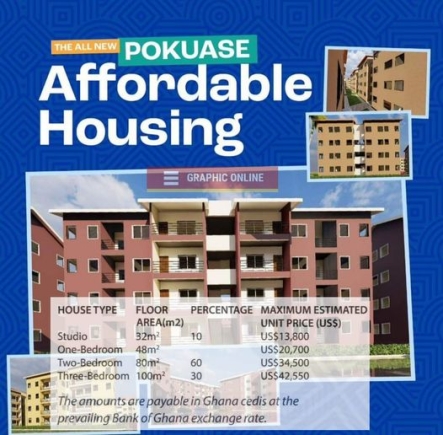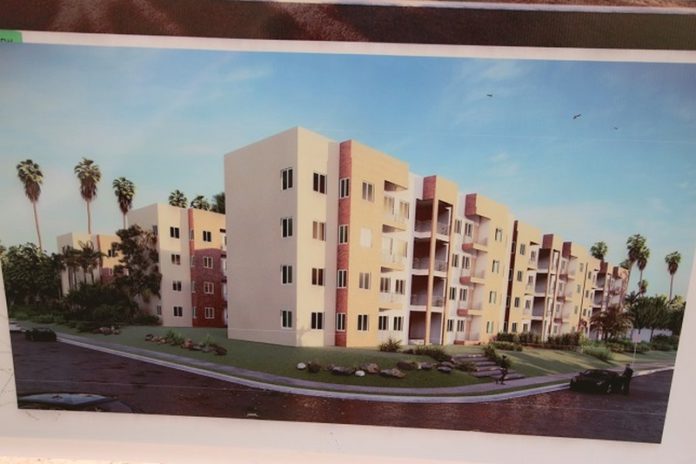See the prices of the recently announced National Affordable Housing project at Pokuase.

Studio – $13,800
One bedroom – $20,700
Two bedroom – $34,500
Three bedroom – $42,550
The amounts are payable in cedis at the prevailing exchange rate and developers cannot sell above the agreed price ceiling but they can sell below;

Meanwhile, Graphic Online’s Donald Ato Dapatem & Joshua Bediako-Koomson reports that President Nana Addo Dankwa Akufo-Addo on Tuesday [August 1, 2023] cut the sod for the commencement of an 8,000 housing units project on a 203-acre land at Pokuase in the Greater Accra Region under the Revised National Affordable Housing Programme.
Under the programme, dubbed: “My Home, My Peace”, government will subsidise housing units with land and infrastructure to absorb a critical component of the construction cost, while the private sector complements the effort by raising funds to build apartments on a cost-recovery basis.
The project will be in two phases; the first phase, comprising 4,000, will be completed within 18 months, while the remaining 4,000 units will be completed in the second phase, also in 18 months.
It will be undertaken by five developers, namely Rehoboth Properties, State Housing Company Limited, Devtraco Group Limited, FrankPauls Ventures Company Limited, and Douja Promotion Addoha Groupe Limited, each of them credited with several years of experience and expertise, as well as resources.
Government’s commitment to the affordable housing programme is to provide land and on-site infrastructure such as roads, drainage, electricity, water, social services, as well as mortgage subsidies.
The programme has an approved Master Plan that will cater for a wider catchment area beyond Pokuase to include the four adjoining local assemblies.
It will provide facilities such as football fields, tennis court, volleyball court, basketball court, swimming pools and children’s playgrounds to serve the adjoining communities.
Under the revised programme, a further 6,000 housing units on a 200-acre land in Dedesua in the Ashanti Region, which is currently undergoing feasibility studies, will be constructed.
President Akufo-Addo announced that this was the first government housing project that had undergone meticulous feasibility study as a prerequisite for funding from the Ministry of Finance.
“We have left no stone unturned in conducting detailed assessments, including environmental impact and social impact, property impact, traffic impact assessment, housing stress analysis, and financial analysis,” he added.
High Cost
The President said due to the recent high cost of construction materials resulting from the emergence of covid-19, and exacerbated by the Russia-Ukraine War, Ghana could not continue to rely on imported building materials for housing and the construction industry.
He said under the revised affordable housing programme, developers were obliged to incorporate a significant proportion of domestically manufactured building materials such as burnt bricks, which would be utilised to construct fence wall around the project site, and for some of the external walls of the apartments.
“Through this project, we’re paving the way for sustained growth and development of the burnt brick industry, and of the local building materials industry in general so that we can then begin to build cheaper houses to which all our people can have access,” he said.
Demand side
He said the Pokuase Housing Project had also catered for the demand side of the housing project and market through a model based on the successful National House Ownership Fund, which had proven instrumental in providing financial assistance to aspiring home owners.
“We will leverage this existing framework to facilitate the participation of labour unions in accessing mortgages and well-structured payment plan for their members,” he said.
The President said the current urban population was estimated at 58 per cent of the population, with an urbanisation rate of 3.3 per cent, highlighting the pressing issue of housing as a critical developmental challenge.
He explained that statistics indicated that only five per cent of the population could acquire homes without assistance, while 60 per cent required support, facilitated by the state, to access housing, and that the remaining 35 per cent of the population would not be able to access homes even with government subsidies.
He added that the support required by households, falling into the 60 per cent bracket, was in the form of subsidies and policies, and competitively priced mortgages.
President Akufo-Addo said it was for this reason government had designed a sustainable framework to enhance housing delivery in the country.
He said the objective was to increase the production of affordable housing units, and to establish a reliable and sustainable demand side of the housing market that would be accessible to all Ghanaians.
This, he said, would ensure that homes were readily available to all segments of society, including labour unions, both formal and informal, and citizens residing in the Diaspora.
Housing profile
The Minister of Works and Housing, Francis Asenso-Boakye, said when he assumed office in 2021, he undertook a comprehensive review of the public housing profile, which led to the development of a revised framework consisting of two parts: the supply-side and the demand-side.
Mr Asenso-Boakye added that on the supply-side, the government would provide free unencumbered land and associated infrastructure, after which the private sector would be invited to construct the housing units for their subsequent sale at an agreed selling price.
He said on the demand-side, the government, through the National Homeownership Fund under the Ministry of Finance, would provide subsidised mortgages for some of the completed housing units.
He said the Ministry, along with the developers, had extensively engaged the various trade unions, who had agreed to purchase the housing units, and that the strategic collaboration would help to ensure a steady demand for the housing units to contribute to the overall success of the programme.

